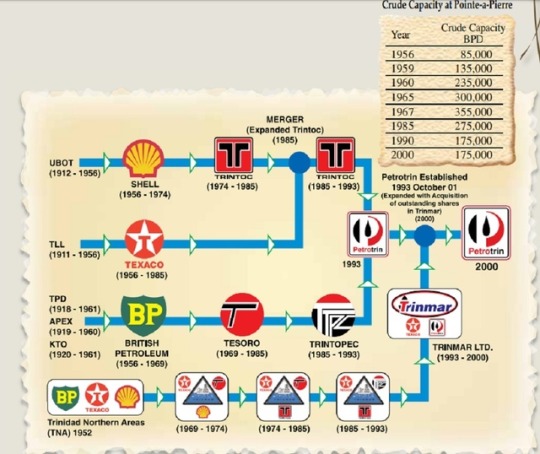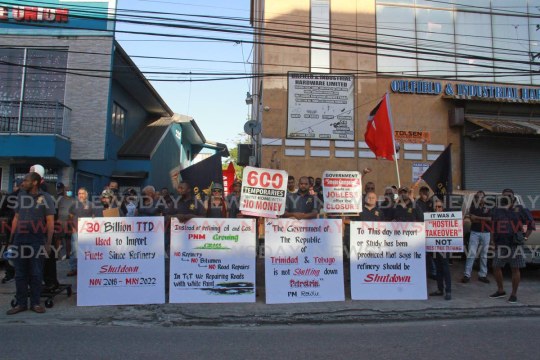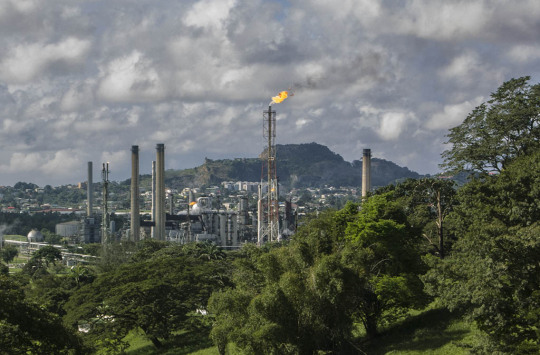#Petrotrin
Text
Union boss on Petrotrin's closure: For Trinidad and Tobago to ... - TT Newsday
Union boss on Petrotrin's closure: For Trinidad and Tobago to ... TT Newsday http://dlvr.it/Szfl4K
0 notes
Video
youtube
Anthony Suchit former worker of Petrotrin expresses concern for resident...
0 notes
Text
Water more than Flour: Crisis of the TT Working Class
The latest iteration of the PNM government headed by Kieth Cristopher Rowley has presented many challenges to local unions and by extension the working class since 2015.
They first moved aggressively against the OWTU and Petrotrin workers to close the refinery. This move was not supported by the either the Lashley committee or HSB Solomon and Associates+ McKinsey and Company Inc. The report from the latter was never laid in parliament. It would be reasonable to assume that the report would have presented a roadblock to the PNM's plans of liberalizing the creation of petroleum products such as gas, kerosene, bitumen, etc.
This was aided by local media who offered little pushback to government's narrative. None of the media sought to get their hands on the HSB report and publish what the recommendations were. They just published government figures and propaganda villainizing Petrotrin workers as unquestionable gospel. While they did report on the positions of the union and other opposing parties, IMO, it fell well below the standard of objective journalism to find the truth and help the public make informed decisions.
Having secured the destruction of Petrotrin with little working class resistance and winning the 2020 election, assisted greatly by the setup of dangling the sale of the refinery to the OWTU's Patriotic Energies, the PNM then swiftly moved on to focus on WASA, TTEC, TSTT and the public sector at large. A major WASA reform was announced and TTEC reform was teased. Petrol Gas subsidies were gradually reduced annually with NO PROPOSALS FOR WAGE INCREASES (I'll get back to this later on) . Property taxes were UNFAIRLY introduced for RESIDENTIAL OWNERS FIRST with businesses due to pay their property taxes later on in the implementation of the scheme.
These changes, along with the COVID pandemic and the Russia-Ukraine war have lead to a crisis for the working class in Trinidad and Tobago. While Minister of Finance, Colm Imbert continues to peddle his speeches of economic recovery, interestingly, he continues to focus on macro-economic numbers such as GDP or GDP per capita. It is my humble opinion that these figures are useless for workers as they do not reflect the day to day purchasing power that workers have. Some key figures workers should demand to see are the mean and median wages for workers and the purchasing power for workers over time. Workers need to see how their dollars stack up against the market. Maybe the esteemed economists who were singing for their supper as the "middle class of TandT", begging for scraps from our capitalist overlords could provide some insight on this.
Naturally, being the opportunists they are, the PNM decided to engage in negotiations with unions in their second term, almost a decade late for most workers. Hoping to take advantage of the pandemic and economic downturn the government offered workers a 2% increase across the board for government workers citing "Country Stability and not wanting to go to the IMF". This was rejected out of hand by most unions and the government returned with a 4% offer. The PNM decided the workers of TT would pay for the country's adjustment disproportionally.
Seeing the impending doom for public sector workers, unions correctly banded together to present a united front under the Joint Trade Union movement against the state, but it was quite clear that they were not willing to go the distance, continuously calling for more "dialogue" time and time again. Some may argue that this was a reasonable position. In theory, and with governments that are innovative and negotiate in good faith I would agree. However, this PNM administration had already struck a crippling blow to the OWTU at this point that should have made it clear to everyone involved that this administration was not fucking around. They were out to impose their will relentlessly and unilaterally. They couldn't care less about worker support.
The repeated calls for dialogue and marches with poor turnouts was the trigger the PNM needed to aggressively pursue this 4% wage policy. They ended the consultative process prematurely and took the matter to the tribunals in the industrial court. Confident off of their win against the TTEC workers, where they gleefully imposed a 0% wage increase on them, the government carefully analyzed and assessed its situation and went in for the kill. Firstly, they could take advantage of a piss poor judiciary that is filled with delays. Justice delayed is justice denied, workers can't wait and struggle forever and would be more incentivized to accept a 4% as time went on. Tribunal-> court of appeal->privy council is a very long time. Secondly, as mentioned before, they believe they could peddle the "stability and imf" to the industrial court. Thirdly, they could take advantage of a working class beaten into submission by the effects of neoliberal policies for decades. worker consciousness and class solidarity isn't what it was (there are reasons for that but i dont have the range for that conversation), also the Prime Minister has been very potent in selling austerity to workers with his "conversations with the prime minister" that he has on a regular basis. Fourthly, not all union leadership is the same, take AWGU for example, they were the first to capitulate under Michael Prentice and it wasn't only that, they misrepresented their position to their fellow unions telling them one thing and doing another. On the flip side, the former TTUTA leader, Antonia De Freitas was militant, urging teachers to take days of "rest and reflection" and urging workers to engage in just collective action until she was stopped by a court order. This brings me to the fifth point, law. the government has the law on their side with respect to public sector workers. The anti-union law designed to break class and worker solidarity prevents public sector workers from engaging in strike action as they are an "essential service". It compels the workers to accept anything the government gives them.
Since AWGU's capitulation, 3 other worker bodies have joined them in accepting the 4% offer. This definitely would not hurt the government's case in the courts. As an engineer, trained to deal with worst cast scenarios, design fail safes and find solutions. i think of this as a system that has gone wrong and needs correction. Assuming that the government would be successful in imposing the 4% wage increase on workers (hoping for the best but preparing for the worst), we need to chart a course forward afterwards. How do we build unions back before they're perceived as useless by the working class. We are seeing a rise in class consciousness all over the globe (UK france spain US), why are we not seeing that here? what lessons are to be learned? how do we transform unionized action into political action and break down the barriers between union and policis.
The following are my initial thoughts on how to go about doing this:
1) The first step is acknowledging that we have a problem with working class consciousness in Trinidad and Tobago. We need to have a nationwide conversation starting with unionized workers and then extending that to non unionized workers. Unions need to understand why they have lost their appeal to workers and the public at large. why would so many people say "what the union good for?". there needs to be soul searching, we cant assume "its cuz rowley lying to the people" or "they don't know better".
2) Splitting of of unions into multiple federations needs to end. at this point the history of the separation of unions into different bodies is mute compared to the threat faced. the time for separation is over. We are dealing with a new phase of capitalist, neoliberalism and it is only through complete solidarity that we could ever hope of overcoming this
3) Unions MUST become political forces to secure the interest of the working class. if the PNM administration is going to use the law as a weapon to dismantle collective action and the working class wants to remain on the right side of the law, then the only option available is to take political power and remove the mechanisms of oppression through working class parties and lobby for the working class or change it outright if we get enough seats. Some unions in the UK (and recently in the US) draw clear political lines for their members. workers must be actively encouraged to vote as a block.
4) ^building off the last point, unions must work at dismantling the separation in workers minds between their union and political action. There is already a party created by a former union leader on the local landscape, the MSJ. They are already building coalitions and grass roots connections. This is a terrific start and we must advocate for people to move in this direction.
5) Unions and working class political parties must advocate for campaign finance reform and changes in the electoral system that would be more democratic and make it easier for independents + grass roots politicians
6) unions and working class political parties must develop and engage in mutual aid schemes for workers and communities. They should develop "funds for struggle", to minimize effects of labor struggle against capitalist overlords and also assist the most vulnerable.
In conclusion, now is the time for solidarity, reflection and intensive action from the working class lead by unions and working class political parties that have the organizational and mobilizational structure built in. If we keep on losing, we may run out of chances to lose, completely dead in the water forever.
0 notes
Text
A Petrotrin story
Above: Petrotrin’s refinery, East Area FCCU in 2004. Photo by Mark Lyndersay.
BitDepth#1163 for September 20, 2018
Between November 2003 and October 2005, I accepted a contractual communications role in the Corporate Communications Department at Petrotrin.
It was the best of times. It was the worst of times.
Petrotrin was in the midst of one of its cycles of great wealth, which happened when the…
View On WordPress
1 note
·
View note
Photo

0 notes
Photo

Solidarity with oilfields workers in Trinidad and Tobago
The World Federation of Trade Unions, representing 92 million workers in 126 countries all over the world, expresses its class solidarity with the workers of Trinidad and Tobago State Petroleum Company, Petrotrin, who have decided to go on a strike, defending their right to a wage increase.
As the OWTU [Oilfields Workers’ Trade Union] representatives have pointed out, for the past six years, Petrotrin had offered zero-zero-zero, denying workers of any wage adjustments. Therefore, after 19 hours of negotiations, the employers’ side didn’t show any spirit of compromise. The Petrotrin workers risk life and limb, working in varying dangerous conditions, to guarantee a reliable supply of fuel to the travelling public; the Trinidad and Tobago people know better than anyone that the country’s economy is based on products made possible by the tireless efforts of these workers. That’s why we call upon the workers and the simple people of the country to stand by the Petrotrin workers, ignoring the employers’ appeals to not struggle.
We once more reiterate our support to the Petrotrin workers and to any form of struggle they decide to follow, underlining that all the wealth belongs to those who produce it.
12 notes
·
View notes
Note
did you vote in the general election on monday? what are your thoughts on how everyone's responded to the results? it was also my first time voting and facebook since monday night has been wild... mad racist all different kinda ways.
I did vote (my parents made me get up at FIVE IN THE GODDAMN MORNING) (and it was my first time if u dont count local govt election)
frankly, none of the parties aligned with ANY of my political opinions and the one party I kinda liked (pep LMFAO) didn't even have a candidate in naparima which :///// but pnm winning wasn't even surprising, like they chose the right time to call an election (I mean, positive response from the public on the covid situation so it's like petrotrin never happened 👁👁)
and the unc?????? imo the unc wouldve won HAD watson duke + pdp won tobago east and west (and I rly that he wouldve gotten tobago east AT LEAST, but oh well)
but the RESPONSE,,,,, god,,,, that ramsuran lady WHY, like literally the last thing t+t needs is MORE racism, like from both sides its absolutely disgusting how people responded to the results (thankfully I dont use Facebook anymore so I don't rly know the Full Extent but from what I saw in ig its BAD........)
but I dislike both unc and pnm and as rowley says: things aren't going to be easy in the coming years and he IS right,,,,, with covid cases on the rise and yknow possible economic collapse, let's just hope the next five years wont be too rough!
#tho i think its mad crazy how people literally TWO MONTHS AGO was protesting against police brutality and by extent the govt to just.#to just vote back in the same govt like wheres the logic luv#its just terrible on both sides but honestly idk why ppl are surprised pnm won like#(and i didnt even vote for them LMFAO)#i mean it cool if u did no hate here#but the election rly bring out the racism in people is so fucking disgusting#emily speaks#long post
4 notes
·
View notes
Photo

Glorious Glow #trini #trinidad #trinidadandtobago #caribbean #photography #androidphotography #landscape #sunset #petrotrin #lake #colours #vivid (at PETROTRIN)
#photography#vivid#caribbean#trinidad#landscape#sunset#trini#androidphotography#colours#petrotrin#lake#trinidadandtobago
1 note
·
View note
Photo

United Petrotrin Logo sports http://www.ligu.net/sports-brand/united-petrotrin-logo-324709
0 notes
Text
Trinidad and Tobago in talks with Quanten LLC for refinery sale -minister By Reuters
Trinidad and Tobago in talks with Quanten LLC for refinery sale -minister By Reuters
© Reuters. FILE PHOTO: The installations of an oil refinery, operated by state-run Petrotrin, are seen in Point-a-Pierre, Trinidad and Tobago September 7, 2018. REUTERS/Andrea De Silva/File Photo
PORT OF SPAIN (Reuters) – Trinidad and Tobago is in talks with U.S.-based Quanten LLC for the sale of the country’s refinery, Energy Minister Stuart Young said on Sunday, more than a year after the…

View On WordPress
0 notes
Text
Petrotrin
Petrotrin was a Trinidad and Tobago state owned oil company . The full name of the company was Petroleum Company Trinidad and Tobago Limited and it was established in 1993 after the merger of Trintoc and Trintopec. It is a state run company with the finance minister and the energy minister acting as the corporation sole and the line ministry that provides specialized technical analyses and…

View On WordPress
0 notes
Text

Roget: Trinidad and Tobago worse off because of Petrotrin closure - TT Newsday http://dlvr.it/SdwBPH
0 notes
Video
youtube
Wendy Brewster of Battoo Ave. Marabella laments Petrotrin oil Spill of 2...
0 notes
Photo

Facing north , with a view of the gulf of paria to the left and petrotrin to the right. #night #nightphotography #nightsky #longexposure #long_exposure #longexposure_shots #instadaily #instagood #stars #refinery #oil #oilrefinery #sea #ship #ships #tankership #city #citylights #astrophotography #followme #trinidad #trinidadandtobago 🇹🇹 🇹🇹🇹🇹🇹🇹🇹🇹🇹🇹🇹🇹🇹🇹 #island #islandlife #caribbean #caribbeanphotographer #emilerahamanphotography 📸📸📸📸📸📸📸📸 (at San Fernando, Trinidad and Tobago)
#nightsky#trinidadandtobago#stars#nightphotography#refinery#sea#caribbeanphotographer#ship#islandlife#longexposure#caribbean#island#citylights#city#long_exposure#instadaily#oilrefinery#instagood#astrophotography#longexposure_shots#emilerahamanphotography#night#tankership#ships#trinidad#oil#followme
1 note
·
View note
Text
Carnival is not a product
Carnival is not a product
Above: Petrotrin flared gas as part of its refinery process for decades. The flame finally went out when the refinery shut down. Photo by Mark Lyndersay.
BitDepth#1286 for January 28, 2021
The history of Carnival as a cultural festival is deeply entwined in both this country’s experience as a colony its creation as a source of resource extraction.
There are some interesting parallels that…

View On WordPress
#Carnival#Creativity#Extractive Industries#Management#NCC#NGC#Petroleum Sector#Resources#Sustainability
0 notes